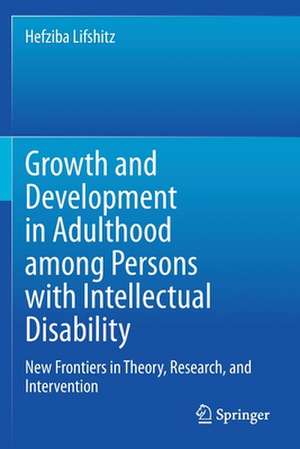Growth and Development in Adulthood among Persons with Intellectual Disability: New Frontiers in Theory, Research, and Intervention
Autor Hefziba Lifshitzen Limba Engleză Paperback – 24 mar 2021
| Toate formatele și edițiile | Preț | Express |
|---|---|---|
| Paperback (1) | 587.20 lei 6-8 săpt. | |
| Springer International Publishing – 24 mar 2021 | 587.20 lei 6-8 săpt. | |
| Hardback (1) | 593.59 lei 6-8 săpt. | |
| Springer International Publishing – 24 mar 2020 | 593.59 lei 6-8 săpt. |
Preț: 587.20 lei
Preț vechi: 690.83 lei
-15% Nou
Puncte Express: 881
Preț estimativ în valută:
112.38€ • 116.89$ • 92.77£
112.38€ • 116.89$ • 92.77£
Carte tipărită la comandă
Livrare economică 14-28 aprilie
Preluare comenzi: 021 569.72.76
Specificații
ISBN-13: 9783030383541
ISBN-10: 3030383547
Pagini: 332
Ilustrații: XXIX, 332 p. 30 illus.
Dimensiuni: 155 x 235 mm
Greutate: 0.51 kg
Ediția:1st ed. 2020
Editura: Springer International Publishing
Colecția Springer
Locul publicării:Cham, Switzerland
ISBN-10: 3030383547
Pagini: 332
Ilustrații: XXIX, 332 p. 30 illus.
Dimensiuni: 155 x 235 mm
Greutate: 0.51 kg
Ediția:1st ed. 2020
Editura: Springer International Publishing
Colecția Springer
Locul publicării:Cham, Switzerland
Cuprins
Part 1: Theories and Models of Growth, Development, and Intervention for Adults with Intellectual Disability.- Chapter 1. Compensation Age Theory (CAT): Effects of Chronological Age on Cognitive Ability in Individuals with Intellectual Disability.- Chapter 2. The Triple CAB Model: Enhancing Cognition, Affect, and Behavior in Adults with Intellectual Disability.- PART II: Implementation of the Triple Cab Model for Adults with Mild to Moderate Intellectual Disability.- Chapter 3. Post-Secondary Academic Programs for Adults with Mild and Moderate Intellectual Disability.- Chapter 4. Leisure and Cognitively Stimulating Activities as Means for Improving Cognitive Performance in Persons with Intellectual Disability during Adulthood.- PART III: Implementation of the Triple Cab Model for Adults with Severe To Profound Intellectual Disability.- Chapter 5. The Triple CAB Intervention for Adults with Severe/Profound Intellectual Disability to Enhance Opportunities for Growth and Life Quality.-Chapter 6. Cognitive Rehabilitation to Enhance Life Quality and Daily Functioning in Elderly Persons with Intellectual Disability and Alzheimer’s Disease: The Triple CAB–E Intervention Model.- PART IV: The Adult with Intellectual Disability as a Whole Human Being.- Chapter 7. Affect and Emotional Intelligence in Populations with Intellectual Disability.- Chapter 8. Epilogue: Conclusions and Future Directions.
Notă biografică
Hefziba Lifshitz is an Associate Professor at the School of Education of Bar-Ilan University, Israel, where she heads the master’s program in intellectual disability (ID). Lifshitz holds the Lois Machado Chair for Cognitive Modifiability and Human Development and also chairs the Baker Research and Developmental Center for Young Children with ID. In these roles, she became aware of the need for research oriented to cognitive educational rehabilitation, relating specifically to the developmental potential inherent in the adulthood period among populations with ID. To date, she has focused her body of research on empirically examining her compensation age theory (CAT) and evaluating the triple CAB (cognition-affect-behavior) intervention programs that she designed for persons with all ID severity levels and etiologies. The Otzmot Empowerment Project that she initiated now includes multiple stages of inclusion in the academic world for adults with ID. Six such post-secondary students who are currently fully included in regular academic courses are expected to complete their BA degree in 2022.
Textul de pe ultima copertă
This volume advocates an optimistic new conceptual and practical approach to adulthood, aging, and education for individuals with intellectual disability (ID) across the lifespan. The compensation age theory (CAT) at the heart of this book suggests that the adulthood period in populations with ID may be characterized by processes of cognitive development, growth, and neural sprouting, rather than stagnation or even decline. Empirical findings indicate the contribution of chronological age, maturity, and accumulating life experiences to adults’ continued cognitive growth and intelligence, as a result of direct mediation, cognitive intervention, and academic learning as well as exposure to indirect learning. Grounded in cumulative evidence for the CAT, the book presents comprehensive analysis of a practical holistic educational intervention model for enhancing adults’ Cognition (literacy), Affect (including autonomy), and Behavior (adaptive behavior skills), including operative strategies, mediational parameters, and guidance for change agents in diverse settings. This triple CAB model offers detailed tools for promoting the cognitive improvement and invigoration of adults with ID in during ADL, vocational and leisure activities, at all severity levels ranging from mild and moderate to severe and profound, across different ID etiologies including Down syndrome, and even at advanced ages for adults with ID exhibiting comorbid Alzheimer’s.
Caracteristici
First book to discuss Emotional Intelligence of individuals with ID and advocate an optimistic Compensation with Age Theory based on research indicating adults' cognitive growth and neural sprouting Covers the implementation of the CAB triple model for adulthood and old age at all levels of ID Supported by theoretical resources drawn from both special education and theories designed for the general population adapted for individuals with ID
